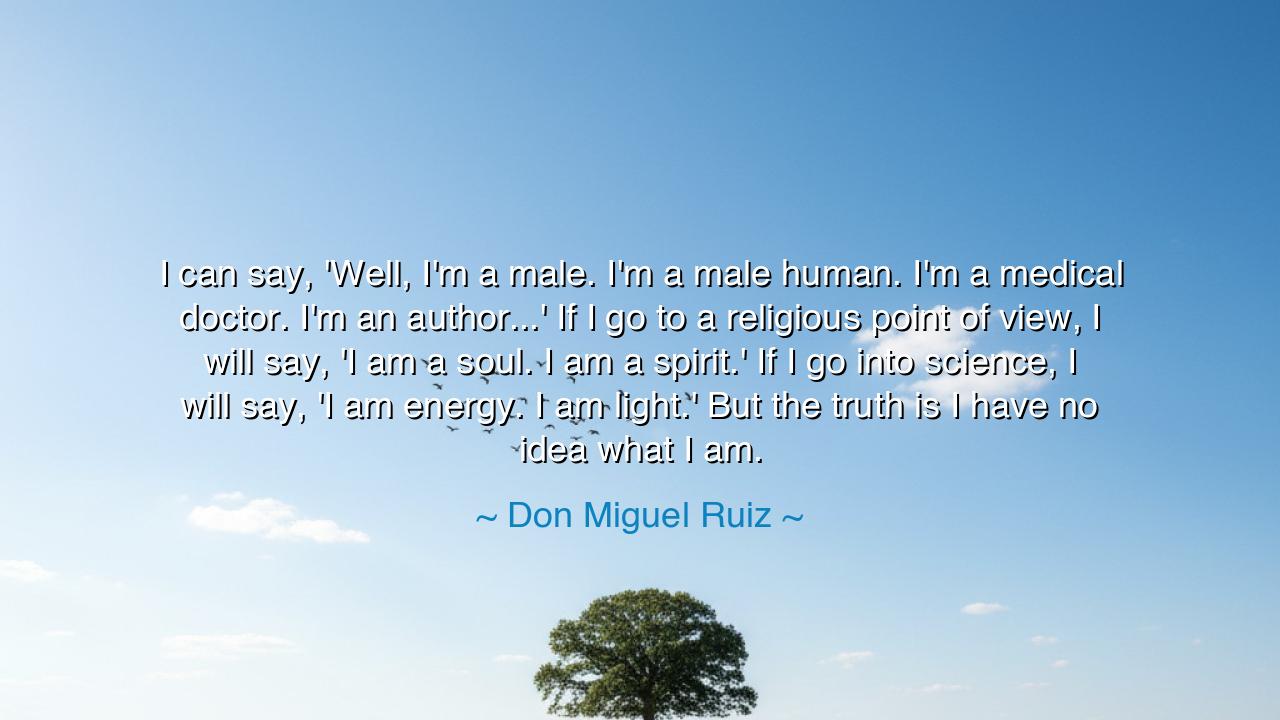
I can say, 'Well, I'm a male. I'm a male human. I'm a medical
I can say, 'Well, I'm a male. I'm a male human. I'm a medical doctor. I'm an author...' If I go to a religious point of view, I will say, 'I am a soul. I am a spirit.' If I go into science, I will say, 'I am energy. I am light.' But the truth is I have no idea what I am.






In the vast expanse of existence, the search for identity and purpose is one of the most profound journeys a person can embark upon. Don Miguel Ruiz, in his thought-provoking words, reveals the essence of this journey: "I can say, 'Well, I'm a male. I'm a male human. I'm a medical doctor. I'm an author...' If I go to a religious point of view, I will say, 'I am a soul. I am a spirit.' If I go into science, I will say, 'I am energy. I am light.' But the truth is I have no idea what I am." In this reflection, Ruiz speaks to the deep mystery of human identity—how we often try to define ourselves by labels and roles, yet the true nature of our being eludes us, remaining something greater and more complex than any singular definition.
In the ancient world, philosophers and mystics sought to understand the essence of being, questioning what it means to truly exist. Socrates, the great Athenian philosopher, famously declared, “The unexamined life is not worth living.” For him, the pursuit of self-knowledge was the highest calling, a journey into understanding one’s true nature beyond the superficial labels that society imposed. Plato, his student, believed that the essence of human beings was rooted in the soul, an eternal, divine part of us that existed beyond the physical realm. Socrates and Plato, like Ruiz, acknowledged that the nature of humanity transcends simple classifications—it is not enough to define ourselves by our bodies or by our intellect; there is a deeper truth, a truth that exists beyond what can be seen and measured.
Consider the story of Buddha, who, after years of seeking answers to the nature of human suffering, discovered that our true essence is not found in the external world, nor in the roles we play in society, but in the stillness of the mind and the awareness of our inner spirit. Buddha’s realization that attachment to material things and identities causes suffering offers a parallel to Ruiz’s statement: when we identify too strongly with the roles and labels we wear—whether as a doctor, a man, or even a spiritual being—we are bound by false identities that obscure the true nature of our existence. In his teachings, Buddha urged people to look beyond the ego and connect with the deeper, more expansive nature of the self, which is beyond labels, beyond form, and beyond time.
The great philosopher Rene Descartes pondered the nature of existence with his famous statement, "Cogito, ergo sum"—"I think, therefore I am." For Descartes, the act of thinking, of being conscious, was proof of existence. However, his conclusions were focused on the intellectual realm, and even he struggled to define the true nature of the self. He was bound by the belief that the mind and the body were separate entities, yet he could not define the spirit—the essence that transcends the intellect and the body. In contrast, Ruiz acknowledges the mystery of the self, expressing uncertainty about what he truly is, while still recognizing the need to explore the different dimensions of being—mind, body, and spirit. Ruiz’s approach suggests that the act of questioning is itself a path to understanding.
Ruiz’s words also speak to the ephemeral nature of existence. When we define ourselves by the roles we hold in life—whether they are professional, familial, or social—we limit the expansive potential of who we can be. Homer's Odyssey provides a powerful example of this. Odysseus, the great hero of ancient Greece, undergoes a journey that transforms his understanding of identity. Though he is a king, a warrior, and a father, his long journey home teaches him that his identity is fluid, subject to the trials of fate and the choices he makes. Like Ruiz, Odysseus learns that true self-awareness cannot be found in titles or accomplishments, but in the journey itself, the quest for deeper understanding, and the humility to accept that we are ever-changing.
The lesson here is profound: we are not defined by the titles we hold or the roles we play in life. Whether we are medical doctors, artists, or spiritual seekers, these are but external aspects of who we are. The true essence of our being—our soul, our spirit, our energy—is a mystery that cannot be easily defined. As Ruiz suggests, we must embrace the uncertainty of our identity and be open to the exploration of who we truly are, not just through the lens of society’s expectations but through the lens of self-awareness and spiritual insight.
In our own lives, we must question our attachments to labels and roles. Who are we beyond the identities we have constructed for ourselves? Are we the sum of our actions, our titles, or our physical forms? Let us look inward and, like Socrates, seek the truth of our existence, knowing that the journey is as important as the answer itself. By embracing the mystery of who we are, we can open ourselves to deeper understanding and greater peace. In this way, we can embody the wisdom of Ruiz and the ancients, recognizing that we are both more and less than the roles we claim to define us.






AAdministratorAdministrator
Welcome, honored guests. Please leave a comment, we will respond soon